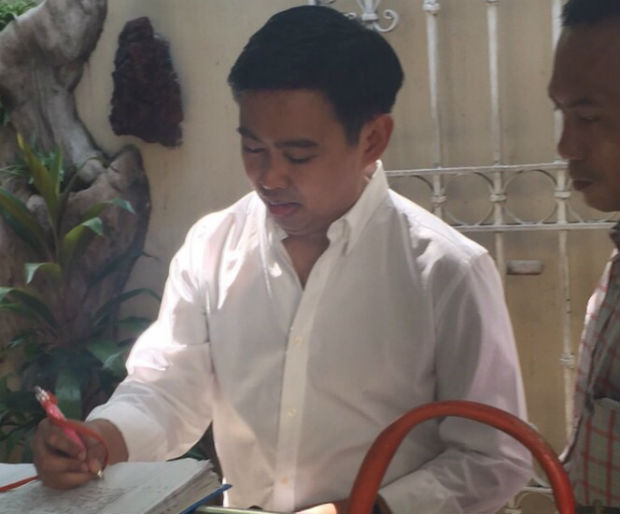SC: Binay plea moot with his dismissal
Makati Mayor Jejomar Erwin “Junjun” Binay’s petition questioning his preventive suspension in March for six months has become moot after he was sacked by the Office of the Ombudsman last month, the Supreme Court has ruled.
The Court of Appeals (CA) did not err in issuing a temporary restraining order (TRO) temporarily stopping Binay’s suspension by Ombudsman Conchita Carpio Morales in connection with the alleged overpriced P2.3-billion Makati City Hall Building II, the high tribunal said in a decision, a summary of which was released to reporters.
But a second suspension order issued by Morales in July in the alleged anomalous deals involving the construction of the Makati Science High School building forced the son of Vice President Jejomar Binay to step down after he failed to get a second TRO.
Last month, Morales ordered Binay’s dismissal altogether for grave misconduct and dishonesty, saying there were irregularities in the services and contract for the construction in several phases of the parking building.
In its ruling, the Supreme Court voted to abandon the “condonation doctrine”—or the effective pardon from administrative liability by virtue of reelection—as a prospective ruling, making Binay’s case the last in which the principle was legally invoked.
Article continues after this advertisement“Thus, by merely following settled precedents on the condonation doctrine, which at that time, unwittingly remained a ‘good law,’ it cannot be concluded that the CA committed a grave abuse of discretion based on its legal attribution above,” read the ruling, a summary of which was released Wednesday.
Article continues after this advertisement“Accordingly, the WPI (writ of preliminary injunction) against the Ombudsman’s preventive suspension order was correctly issued,” read the ruling, in reference to the order the CA had issued in April in Binay’s favor.
The high court directed the CA to act on Binay’s certiorari plea against his suspension in light of his “supervening” dismissal. While leaving the matter up to the appellate court, the Supreme Court said the petition should be thrown out as it is already moot.
“Considering that the Ombudsman, on Oct. 9, 2015, had already found Binay Jr. administratively liable and imposed upon him the penalty of dismissal, which carries the accessory penalty of perpetual disqualification from holding public office, for the present administrative charges against him, the said CA petition ought to be dismissed on the ground of mootness,” the high court said.
Utmost dispatch
The high court also ordered the appellate court to resolve “with utmost dispatch” Binay’s separate petition to cite former Interior Secretary Mar Roxas, Makati Mayor Kid Peña, Justice Secretary Leila de Lima, and several police officers for contempt for refusing to honor the TRO the CA had issued in March.
Reading some details of Tuesday’s en banc ruling, court spokesperson Theodore Te said the court voted to abandon the condonation doctrine as it was neither based on a statute nor the 1987 Constitution.
“The court read the 1987 Constitution in relation to the Local Government Code provisions on discipline of public officers and found that the condonation doctrine is bereft of legal basis. It also noted that none of the LGC provisions states that the administrative liability of a public official is extinguished by the fact of reelection,” Te said in a press briefing Wednesday afternoon.
The court, he said, “found no basis for saying that election of an official to a new term fully absolves the official of any administrative liability arising from an offense done during a prior term.”
No official may, hence, ever invoke the doctrine when faced with administrative investigation.
“This court simply finds no legal authority to sustain the condonation doctrine in this jurisdiction. As can be seen from this discourse, it was a doctrine adopted from one class of US rulings way back in 1959 and thus, out of touch from—and now rendered obsolete by—the current legal regime. In consequence, it is high time for this court to abandon the condonation doctrine,” the court said.
The high court also ruled against provisions on the 1989 Ombudsman Act that restricted judicial review against decisions and orders of the office, government’s chief investigating body against official wrongdoing.
In its ruling, the high court rendered Section 14, Paragraph 1 of the act as “ineffective until the court gives its consent,” and Paragraph 2 as “unconstitutional.”
The first part of the section “prohibits any court, except the Supreme Court, from issuing a writ of injunction to delay an investigation being conducted by the Office of the Ombudsman,” the high court said.
The court said this “encroached on the Supreme Court’s constitutional rule-making authority,” hence breaching the separation of powers.
Paragraph 2, meanwhile, “prohibits any appeal or application for remedy against the decision or findings of the Ombudsman, with the exception of the Supreme Court on pure questions of law” through a certiorari petition.
The court ruled that this was unconstitutional as it “bans the whole range of remedies against issuances of the Ombudsman,” save for going directly to the high court.
“The court found that this was vague for two reasons: (1) it is unclear what the phrase “application for remedy” or the word “findings” refer to, and (2) it does not specify what procedural remedy is solely allowable to the Supreme Court except that it may be taken only on a question of law,” said Te in the briefing.
The ruling was released more than six months after Morales decided to implead the appellate court and Binay for challenging its authority to suspend officials under investigation.
